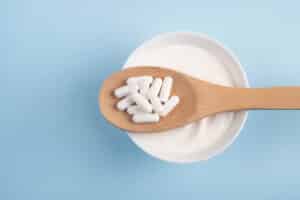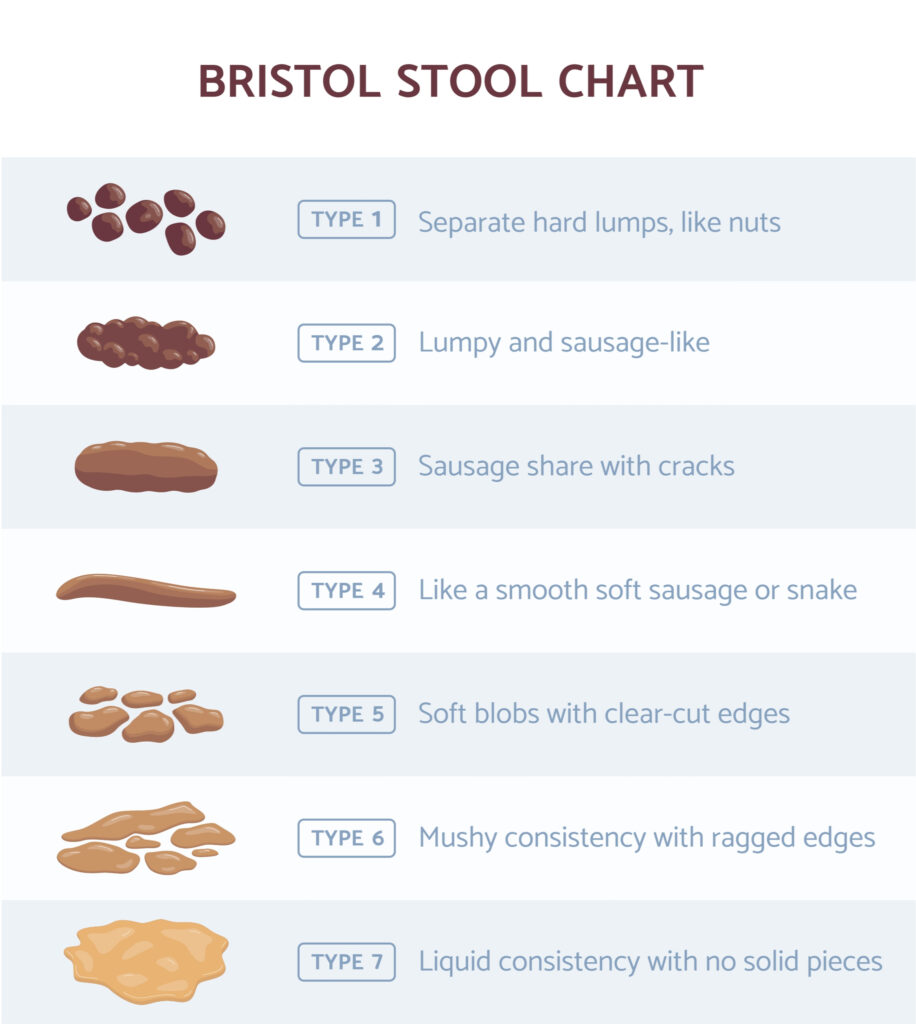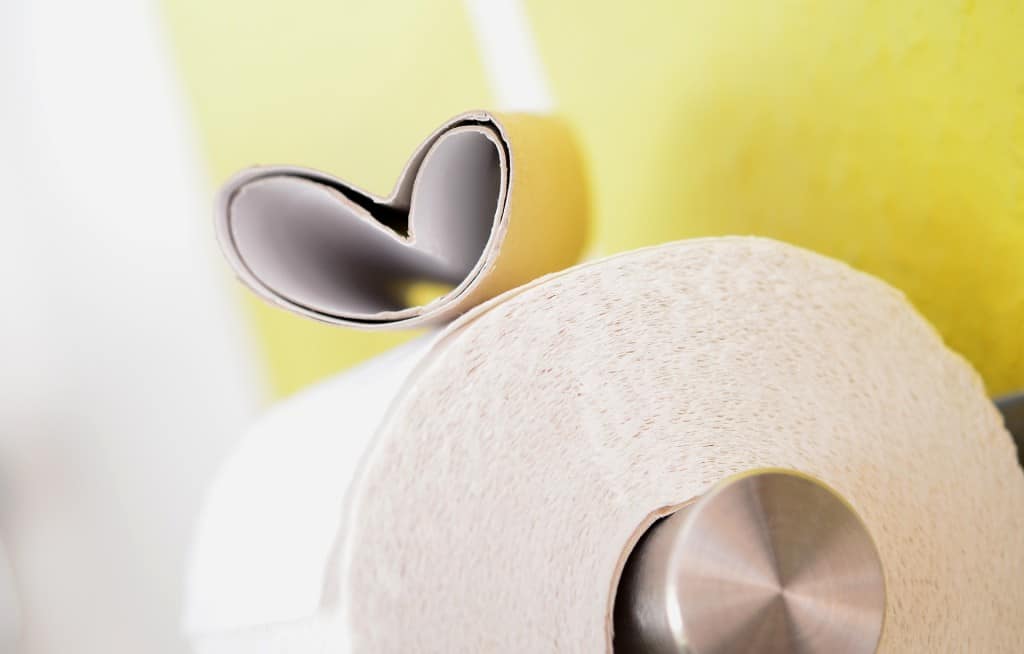Table of Contents
What are Probiotics?
Probiotics are living microorganisms, specifically bacteria or yeast strains, that are taken via a supplement or found in fermented foods (yogurt, kefir, kimchi, sauerkraut, kombucha, and miso).
Because they’re such a hot topic, many people are trying probiotics to help with their digestive problems.
So do probiotics cause you to poop? Spoiler alert: they aren’t laxatives, but research shows some strains can help with constipation….and for most, they will help improve the quality of your bowel movements.
You’ve got to keep reading, though, because understanding nuances here is really important! Plus we’ve got specific brand recommendations for you below.
Let’s start with getting on the same page about what normal bowel movements should be, and then we’ll talk about how probiotics can help and which ones have the best research behind them.
What Does Normal Poop Look Like?
In our practice, we talk about bowel movements all day long with our clients, so for us, poop conversations are a normal part of life. But you might not discuss your bathroom habits with anyone (except maybe your doctor if you think something is wrong).
So many of our clients have never been told what their poop should look like…and even worse – they’ve never been asked about their bowel movements.
Since your poop can tell you a lot about your overall health, knowing what healthy stool should (and shouldn’t be) is important!
Normal bowel movements should be:
- Be a 3 or a 4 on the Bristol stool chart
- Brown
- Feel complete
Normal bowel movements should NOT:
- Be a 1 or 2 on the Bristol stool chart, which can indicate constipation
- Be 5, 6, or 7 on the Bristol stool chart, which can mean diarrhea
- Be urgent
- Contain excessive amounts of mucus
- Have identifiable food particles in it
- Contain blood (either bright red or black)
- Be orange, yellow, or white
- Be greasy
How Many Times Should I Poop in a Day?
You should have at least 1 bowel movement per day, and for some people, pooping 3 times a day is okay!
We often work with clients who say they only have a bowel movement once every 3 days or even once a week.
Well, even if that is normal for you, that is NOT a sign of a healthy digestive system.
It’s normal to need to poop after all three of your meals. With that being said, it shouldn’t be so urgent that you need to run to the bathroom.
Pooping is the final phase of detoxification, so if you aren’t pooping daily, you’re not eliminating toxins properly. Constipation also interferes with hormone metabolism, so it really needs to be addressed if it’s an issue for you.
If you aren’t pooping every day, be sure to check out our constipation tips.
Probiotics for Constipation
Constipation is defined as having 3 or fewer bowel movements per week.
Other constipation symptoms include:
- Incomplete emptying
- Hard stools (1 or 2 on the Bristol stool chart above)
- Straining and difficult to get out
The majority of research looking at the benefits of probiotics for constipation has shown that probiotics do help, but benefits are strain-specific, and multi-strain probiotics seem to have a lot of success. Conclusions from several studies are listed below:
- Single-strain probiotics, such as Bifidobacterium lactis or bifidobacterium longum, did NOT improve constipation (1, 2)
- Using high dose Visbiome improved constipation symptoms and improved stool consistency in constipated adults (3). Within a month of stopping the probiotic, symptoms returned.
- In constipated adults, multi-strain probiotics caused 1 more bowel movement per week and sped up gut transit time by about 15 hours. (4).
- In people with Parkinson’s disease, a multi-strain probiotic caused 1 more bowel movement per week and helped create a softer stool (5).
- In people that suffer from irritable bowel syndrome or IBS, particularly the constipation dominant type, supplementing with a multi-strain probiotic improved pain, bloating and gas (6).
- The single strain, Lactobaccillus Reuteri, improved chronic constipation and improved gut motility (7).
- While most research on probiotics is in people with chronic constipation or irritable bowel syndrome, in healthy people, multi-strain probiotics can also soften hard stools, increase weekly bowel movement frequency and improve straining (8).
In summary, probiotics can help with the following:
- causing more bowel movements per week
- softening hard stools
- reducing straining
- improving gut transit time
We recommend Microbiome Labs Pyloguard, Klaire Labs Therbiotic Complete, or Visbiome High Potency Probiotic for constipation.
Why do Probiotics Make You Poop?
Probiotics do NOT work like laxatives which can stimulate a bowel movement immediately.
The effects of probiotics take time, so you’ll want to stay on them for several weeks. If you don’t see improvement after a month, it’s time to try a different option.
If you do see health benefits, you will need to stay on the probiotic for it to continue to work.
Although the mechanism of action isn’t yet fully understood, there are several possible explanations as to why probiotics can help with constipation. We do know that probiotics offer the following benefits:
- Better diversity in the gut microbiome, increasing good gut bacteria and reducing the growth of harmful bacteria (that could be causing constipation, such as methane producers) (9)
- Alter gene expressions in the gut
- Strengthen the gut barrier
- Breakdown bile acids
- Speed up gut transit time
- Regulate the nervous system (10)
Although probiotics are generally considered to be safe, there can be some side effects.
There’s typically an adjustment period when beginning a probiotic. During this time, they can cause you to have more frequent bowel movements or change the consistency of your stool.
If probiotics are causing negative side effects for you, try dialing back on the dosage and slowly ramping up to a full dose over the course of a few weeks.
Conclusion
If you’re constipated, the probiotics we recommend are worth trying as part of a comprehensive constipation protocol.
We also recommend working with one of our dietitians to get to the root cause of your constipation for long-term relief!





Leave a Reply